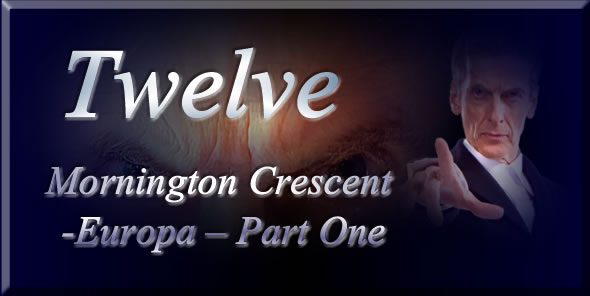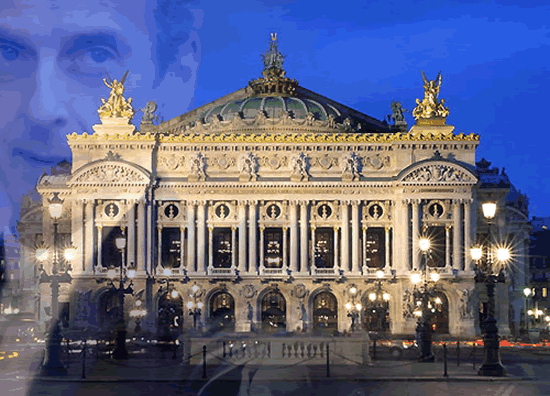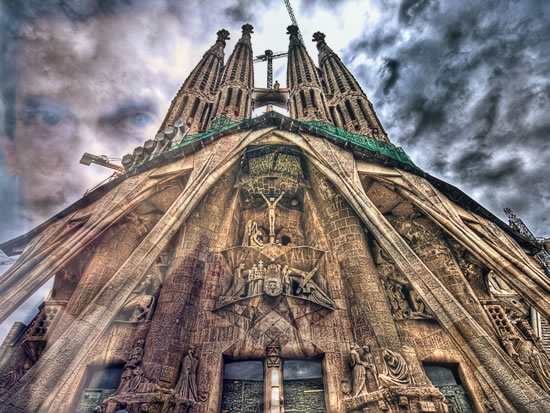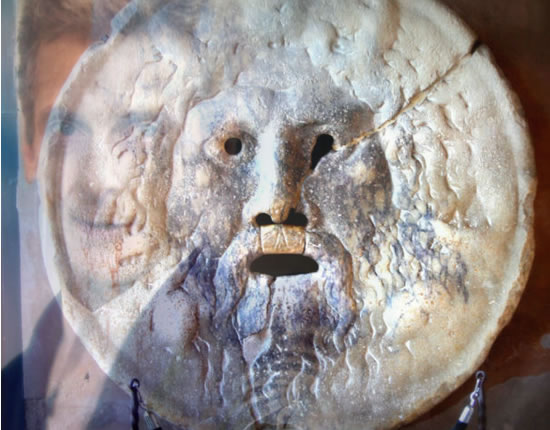

“London,” Marie remarked as they stepped out of the TARDIS into a street that was already busy despite it being early in the morning. The style of the red double-Decker buses and the films advertised on their sides indicated that it was her own era, give or take a year. “Okay, not exactly exotic, but I’m sure there’s something interesting going on here seeing as you brought me along for the weekend.”
“I checked. The most exciting thing happening in your country in the next two days is the launch of Irish Strictly. Even an ordinary traffic jam in London would be more interesting. But as it is, Mornington Crescent is going International.”
“Ah, well, that’s nice,” Marie responded in a tone that subtly implied she had no idea what or where Mornington Crescent was.
“I knew you’d like the idea,” The Doctor replied. He didn’t do subtle implications! He looked both ways, then ignored the traffic altogether as he crossed the road, heading towards an old-fashioned London Underground station built of red painted brick and white framed half circle windows. Marie found a pelican crossing before joining him. She noted that the station was called Mornington Crescent, which partly answered one question.
“We didn’t pay to come down here,” she said as they descended a long escalator in a rounded passageway with walls covered in ceramic tiles and advertisements for West End shows. The Doctor had simply pushed through the ticket barrier and she had followed him because there was nothing else to do.
“The station isn’t open, yet. No trains for an hour.”
The platform was busy, nonetheless, and as they mingled with the crowd Marie started to suspect that none of them were actually commuters of the regular sort. The two men in pinstripe suits and bowler hats might have passed for normal if the pinstripes weren’t yellow and orange. The same went for the man and woman chatting to them. The woman was in a waistcoat suit and the man in a polka dot dress. There was a group of four who looked just too tall to be real, and a pair of short, chubby identical twins who stood so close together they could have been conjoined.
It was as she tried not to stare at the twins that the platform came into focus for her like one of those ‘magic’ pictures that suddenly have a rabbit in them just as your eyes start to water. Once she had seen it, she couldn’t unsee it. The twins really were conjoined, sharing one pair of arms and three leg. The tall people had necks at least a foot and a half long. There were two dwarfish characters, one piggybacked on the other inside a regular sized suit of clothes. By the escalator there was a woman with a face like a dog whose voice was reminiscent of a barking poodle.
“Everyone here is alien,” Marie noted. “Except, possibly, that boy and girl over there by the vending machine. Are they lost, do you think?”
The Doctor looked at the boy aged about nineteen and the girl of fifteen and smiled as if his eyes went back in time by themselves.
“Actually, both of those youngsters were created by alien beings as a way of destroying humanity,” The Doctor remarked casually. “Two separate plots, as it happens. Both of them were adopted by an old friend of mine and live perfectly normal lives… well, as normal as possible, anyway.”
“So you know them? Let’s say hello, then.”
“They don’t know me with this face. Besides, their mum was always a bit ‘over protective’. They’ll think she sent me to watch out for them.”
As ever, The Doctor’s explanations raised more questions than they answered, but things were happening quickly now. A door marked ‘staff only’ opened and a man dressed in gold fabric, in a gold wheelchair, wearing more gold jewellery than a nineteen-seventies DJ, emerged accompanied by two tall, slender blonde women wearing just enough gold lamé to be decent.
“Who is that?” Marie whispered.
“Lord Arthur Sweetwell, fifty-first century inventor of the Vortex Manipulator and a number of other interesting aids to human folly. He retired to the past and sponsored the Mornington Crescent Quest. Every year time travellers from all over the galaxy come to take part in a sort of treasure hunt, seeking out clues and collecting souvenirs. There’s a prize at the end.”
“For the first time,” Lord Arthur was saying. “I have extended the quest to take in other European cities. I hope you will all enjoy this dip into other cultures.”
“Other cultures?” Marie whispered. “We’re ALL from other cultures.”
The Doctor smiled wryly and scanned the platform.
“Yes, that’s true. Not counting my young friends, with their unusual parentage, I believe we can safely say his Lordship is the only person present born within the sound of Bow Bells – and they were digitalised in his time. Just… indulge an old man whose foresight in all other respects is very long ranging.”
“Remember,” his Lordship continued. “There are no rules except that you have to be back here at six o’clock in the morning two days from now, and no being mean to each other or to innocent bystanders. Those of you without personal time travel devices may rent a vortex manipulator, maximum three passengers per trip. I’ll now call forward each team to receive their first clue.”
The two young women were carrying gold baskets with gold envelopes in them. They passed them to his Lordship one at a time. The first to be called up were the cross-dressed couple, Zeiphu and Ciselli Jodaxeususi. Next up were the Amphelice twins, then The Doctor’s young acquaintances, Luke and Sky Smith.
“Luke and Sky?” Marie queried. “Thank goodness their surname isn’t Walker.”
The Doctor said nothing. He watched as Lord Sweetwell examined the vortex manipulator Luke appeared to own and wished them luck. He felt a twinge of parental concern on behalf of his friend, Sarah-Jane, and hoped they would be all right. The Mornington Crescent Quest was not for the inexperienced time traveller.
“The Doctor plus one,” Lord Sweetwell called. The Doctor grasped Marie by the arm and brought her forward. He introduced her as Marie Reynolds of Dublin.
“Good morning, my dear,” his Lordship answered. “Sorry about the ‘plus one’, but we never know who he might bring with him. How many times have you played now, Doctor?”
“This is my twenty-second time,” The Doctor replied almost reluctantly.
“And yet to win my grand prize.” Lord Sweetwell smiled inscrutably and handed over an envelope to Marie.
“Twenty-two times?” Marie queried as they stepped out into the London morning rush hour again, past genuine passengers on the Northern Line going the other way. “Are you like those people in New York who’ve been to see the Rocky Horror Picture Show a hundred times? Do you have a badge for passing twenty-one goes?”
“I like the challenge.”
“And the prize?”
“I leave that for other people,” he insisted. “People who need bottomless purses of money.”
“That’s the grand prize? Wow. Well, if you don’t want it, I’ll take it off your hands.”
They returned to the TARDIS before The Doctor nodded to Marie to open the envelope. Inside was a small, gilt-edged card with a short message on it.
“Fetch a pot of honey from the Phantom’s rooftop.”
“Cryptic, indeed,” The Doctor remarked. “I’ll have to think about that one for a bit.”
“I don’t,” Marie answered him. “At least… I’m not sure about the pot of honey, but we need to go to the Paris Opera.” The Doctor looked sceptical, to say nothing about being put out by her quick resolution of the puzzle. “There’s a little French flag in the corner of the card. Paris, France, home of the Palais Garnier, also known as the Paris Opera House, scene of Gaston Leroux’s novel and Andrew Lloyd Webber’s musical, Phantom of the Opera. I have the DVD. It’s got ‘extras’.”
The Doctor grinned like a carnivore and set the co-ordinates. Marie tried not to look too smug.

A few minutes later they stepped out onto the roof of the Palais Garnier. The TARDIS was incongruously parked beside a verdigris stained cupola. Marie picked her way between skylights and chimneys to the edge of the parapet overlooking the front façade. She held onto a statue of Pegasus and looked down onto the crowded Place de l’Opéra. It was a fantastic site, but gave no clue about honeypots.
She was wondering if one of the numerous statues on the parapet was honeypot shaped when a man called out to her in French, which the TARDIS translated for her as a sort of cockney working class English worthy of Dick Van Dyke. She turned to see an old man moving steadily towards her with dire warnings about how far down the Place was.
“It’s quite all right, Monsieur,” The Doctor told him, holding out his psychic paper. “We’re from the National Association of Rooftop Apiaries. We’re here to check up on the bees.”
“I wasn’t expecting any official visits,” the old man responded. “I’ve had a couple of journalists up here, one of them from the New York Times, would you believe it. And a lady professor from Cambridge in England who was mapping the flights of urban bees. But nothing official.”
“It won’t take long,” The Doctor promised. “Marie, come and meet Monsieur Jean Paucton who keeps the bee hives on top of the Paris Opera House.”
“Pleased to meet you, sir,” Marie said shaking the old man’s hand while The Doctor mimed the phrase ‘Google it’ to explain how he knew these details. She let the charming man show her his wooden hives and explain how he had first brought one box of them up here and found that they thrived among the chimney stacks and roof decorations, travelling, according to the Cambridge lady, as far as the Bois de Boulogne collecting nectar and pollinating plants.
It was all fantastic to hear about, and she had made up her mind to tell the students in her class about the Opera bees on Monday. But she wondered how she could get a pot of honey. Would Monsieur Paucton sell them it?
Then she made a terrible mistake. She stepped on what she thought was a solid piece of the roof and her feet went straight through. She didn’t look, but she had a feeling there was a long drop beneath her. Imagination filled in the rest as she remembered seeing pictures of the great auditorium with a high, gilded roof and sparkling chandeliers. She thought how bad it would be to fall all that way.
“Not so dramatic,” The Doctor whispered as he grabbed her hands. She was sure he was several metres away when she fell, but she wasn’t arguing. “Directly beneath the roof is rehearsal studios for the ballet corps, but you still don’t want to fall in there.”
He hauled her up and set her shaking feet on a solid part. Monsieur Paucton found a flask of coffee to revive her spirits while The Doctor examined the broken section with his Sonic Screwdriver.
“You’d best tell maintenance to get up here and fix that,” The Doctor said to the elderly bee keeper. “Give it a wide berth yourself in the meantime. I don’t think the bees will mind. Floors don’t generally bother them.”
Then he took Marie back to the TARDIS where he gave her a lozenge that tasted of raspberry and which, he said, was good for shock. That done he reset their location to down on Place de l’Opéra.
“It doesn’t do anything for shock, really, does it?” Marie challenged him. “The operative word is ‘placebo’. I’m ok, really. Don’t worry about it.”
“I have to worry,” The Doctor responded. He put the end of his Sonic Screwdriver into a receptacle on the console and peered closely at the data it produced. “It was not an accident. Part of the roof was deliberately weakened using a de-atomising device.”
“You mean somebody wanted me or you to have an accident?”
“That, or the beekeepers at the Museé d’Orsay are really jealous of Monsieur Paucton’s success.”
“I think your first theory is more likely,” Marie conceded. “Really, do they take the Quest THAT seriously? Isn’t one of the rules ‘don’t be mean to each other’?”
“Not everyone obeys rules. Let’s go and buy some honey.”
He strode out of the TARDIS and towards the opulent entrance to the Palais Garnier. As well as the box office advertising a performance of Puccini’s Tosca there was a little shop selling tasteful gifts and souvenirs.
Tasteful and tasty, as it turned out. Marie picked up a jar of Palais Garnier honey and turned it around in her hands. The label had a line drawing of the building with an out of proportion honey bee hovering above it and an explanation of how honey and opera came to be connected.
But there was something else. Marie looked closer at the tiny lettering around the edge of the label. Then she picked up another jar and examined it. That one had no extra lettering. Nor did any of the others on the shelf - only the first one she had picked up.
She took two jars to the checkout, one with and one without extra lettering and paid for them before turning to see The Doctor coming from the box office with tickets for Tosca.
“Puccini… great man. Used to play some good drinking games with him.”
Marie decided not to comment.
“We have to finish the Quest, first,” The Doctor continued. “But we have a TARDIS. We’ll be back in time.”
“Good. We have to go to Catalonia, next.”
“We do?” The Doctor looked at his companion curiously as they stepped back into the Place. “Have you played this game before? You’re far too good for a pudding head.”
“Don’t be rude to a human holding two jars of honey in near proximity to several thousand bees,” Marie replied. “Unless you want your head turning into a sticky pudding.”
The Doctor conceded defeat in that small battle of wits and headed for the TARDIS. He had to wait a while to enter because a group of school girls were taking selfies next to it.
“One of these days I need to fix that chameleon circuit,” he muttered darkly. “Go on, push off and see some culture, pudding brained chatterboxes.”
At last they were able to get into the TARDIS. The Doctor irritably watched the tourists outside while Marie read out the clue on the honeypot and asked an obvious question.
“’Take a weight off the force model of God's architect.’ And HOW could anyone be sure we got the pot with that label on? It was the only one. I checked. But this was the first one I picked up.”
“I’ve never worked that out,” The Doctor answered. “My best guess is ‘magic’, but I’m not entirely happy with that. Oh go away, you numpties. You’re surrounded by fine architecture and you want to take a picture of an old blue box!”

The last bit was to the people outside, obviously.
“In your own time, Doctor, the destination is Barcelona, capital of Catalonia,” Marie said again.
“A political statement in itself,” The Doctor teased her. “Many people would say Barcelona was in Spain.”
“I’m Irish. Do you want a debate about separatist aspirations?”
“Of course not. I just like seeing the tip of your nose go white when you’re riled. And how do you come by that destination? Is there a Catalonian flag on the honeypot?”
“I’m also Catholic. ‘God’s architect’ is Antoni Gaudi. You’ll find him in Barcelona.”
“I knew that. I’m just teasing you. Toni is an old pal. I’m aiming for nineteen-twenty-four. He was doing well, then. His magnum opus was coming along nicely.”
“His magnum opus… the Sagrada Família, of course. One day, I should make you take me there in the future, when its finished.”
“Good idea. Put it on your to-do list. Meanwhile, nineteen-twenty-four.”
The Sagrada Família was a long way from being finished in that time. There was scaffolding all the way up the east side and only two of the fabulous spires were even close to existing. Marie looked at it with undisguised admiration, all the same. It was a unique building from the moment it was conceived in the mind of a genius who stepped away from all the established ideas of religious architecture. To be there while the architect was still alive was one of the reasons she was glad to know The Doctor.
“Doctor, watch out!” Marie was looking up at the cathedral roof so she saw the chunk of masonry starting to fall. The Doctor stepped back and the heavy stone split into several pieces out of harm’s way. The Doctor looked at it accusingly.
“It wasn’t an accident,” Marie told him. “There was somebody there on the roof. This was another go at us after the Palais Garnier.”
The Doctor nodded. He had assumed the very same thing.
“Somebody has it in for us,” Marie added. “Is it to stop us winning the quest, or have you annoyed somebody elsewhere?”
“They could be after you,” The Doctor suggested.
“Who would bother going all over time and space to try to do me in? It has to be you.”
“Surprisingly few of MY enemies have time and space travel capabilities,” The Doctor pointed out. “I wonder… The person on the roof wasn’t dressed like a Mary Poppins from the dark side?”
“I only caught a glimpse. Why? Have you annoyed Mary Poppins?”
“Never mind. Just a thought. Anyway, we have two choices, here. We can quit the game and go for fish and chips in Fishamble Street, or we can carry on, with perhaps a bit more caution than usual.”
“We carry on, obviously, I’m not going to be scared off. Besides, there ISN’T a fish and chip shop in Fishamble Street.”
“Is the right answer,” The Doctor said with a grin. “Come on. This is Toni’s workshop, over here,” Marie laughed softly in wonder. The Doctor was not only on first name terms with Gaudi, but he was able to call him by a short form of his name. That was an idea that sent a shiver of glee down her spine.
The workshop was a sprawling building with roof sections that could be raised to accommodate large pieces of work in progress. The main floor was a noisy place with men carving sections of marble pillars to the architect’s specification or smoothing pieces of wood on a lathe. They passed through that hive of industry to a slightly quieter room where a shabbily dressed man was carefully suspending small, heavy bags from a wooden framework at different heights. He paused to greet his visitors.
“Doctor!” he exclaimed with a smile. “Good to see you.”
“And you, Toni,” The Doctor answered. “This is my friend, Marie, from Ireland, who is an admirer of your work. I have promised to bring her to see the Sagrada when it is complete.”
“It is marvellous already,” Marie assured Gaudi. “Is this… something to do with it?”
She pointed to the arrangement of weights. It looked like it might be a model for a huge chandelier, perhaps.
“It is a force model to test the stresses of gravity on the west elevation,” Gaudi explained. Marie was a little puzzled. “Look at it upside down.”
She did so and realised that the strings and the weights made of little bags of lead shot were actually a model of the Sagrada Família’s as yet incomplete west side. The longer strings were the spires rising up, not pendants hanging down.
“Gravitational forces can be measured either way up,” The Doctor told her. Marie nodded in understanding and wondered how she had forgotten about how Gaudi had designed graceful catenary arches in his buildings by hanging pieces of string at two ends and measuring the curve that was naturally created by gravity before building them the other way around. This ‘force model’ was something similar but more complex.
And the answer to the clue was here. She reached out and touched one of the bags of shot, testing its weight, then she reached into her pocket to find her own symbol of piety that she had been carrying ever since she started travelling with The Doctor – a silver Saint Christopher medal. It was a rather nice one, the size of an old sovereign coin, and reassuringly heavy in her pocket, giving the protection of the Patron Saint of Travellers to her fantastic journeys in the TARDIS. She very carefully swapped one of the bags for the medal. As she hoped, it had no effect on the gravitational stresses upon the force model.
“I’ll swap it back when we’re done,” she promised the puzzled architect. “The Saint Christopher was one of my confirmation presents, so I’ll definitely be coming back for it.”
“That’s quite all right,” Gaudi assured her. “The Doctor has persuaded me to leave my work for a while and have lunch with you both,” he added. Marie thought he needed it. Gaudi was well paid for his work, but he wore shabby clothes and forgot to eat because his mind was on loftier things than food or clothes.
It was a pleasant lunch. Marie kept Gaudi and The Doctor from getting too technical about force models and gravity. Not that she wasn’t interested, but she had a feeling they might both forget she was there if they got too deep into it all.
They walked back to the workshop afterwards and parted cheerfully. At the door to the TARDIS, though, Marie stopped and watched a tram pass by. She looked slowly around the Barcelona street, busy with pedestrians and both motorised and horse drawn traffic. She sighed and stepped inside the TARDIS where the noise and bustle was cut off abruptly.
“Doctor,” she said. “You know the story of how he died, don’t you? Three years from now, coming back from his daily prayers and communion….”
“He went to Sant Felip Nero every day. On June seventh, nineteen-twenty-six he was struck by a tram and fell in the street. Passers by took him for a beggar and ignored him….”
“Even if he were ‘just’ a beggar, it is shameful that people in a Catholic country should be so callous,” Marie said with feeling. “Doctor… what if we were there….”
“It’s a fixed point in time,” The Doctor warned. “It can’t be changed.”
“No, but... if somebody was there to comfort him, to call for an ambulance instead of walking around him….”
“I heard that request once before,” The Doctor said. “Just to comfort him… not to change anything....” He shook his head sadly.
“Please….”
“If I say yes, if we do it… You don’t shout ‘Look out, Toni’ or rush up and push him from the path of the tram or perform an emergency field blood transfusion.”
“Of course not. I understand. Even getting him to hospital a few hours sooner, even making sure people know he IS the great Antoni Gaudi, Barcelona’s greatest son, not a nameless beggar, couldn’t save him. I understand. But at least he’d have a bit of dignity in those hours....”
The Doctor knew exactly how dangerous it was, but something in his own hearts rebelled against the ignominious fate of a good man. He turned to the console and set the co-ordinate.
It was a warm, spring day. Tragedy didn’t belong in such a pretty scene. But it found its insidious way. The tram struck the daydreaming genius and he fell, fatally injured. People walked on by, indifferent to the suffering of a gentle man.
At least they did until Marie knelt by his side and screamed until they stopped to see what was happening. When one well-dressed woman told her not to make such a fuss about an old ‘tramp’ the citizens of Barcelona within earshot learnt just how much fuss a distraught Dubliner could make.
The ambulance came, at last. The unconscious man was put into it. The ambulance drove away and the people of Barcelona carried on their everyday lives.
Marie cried. The Doctor sat her down on a bench within sight of the Sagrada Família and let her cry until the grief was over. When she was down to silent sobs and heaving breaths he pointed to the scaffolded spires.
“He’ll never be dead to you as long as that building stands,” he told her.
“And I suppose you know how long that is?” Marie remarked between heaves.
“A long, long, long, long time after your time,” The Doctor answered. “Come on, let’s carry on with the Quest. You went to such a lot of trouble to get our clue.”
Marie nodded and looked at the little bag of lead shot that had been in her pocket all along.
“Rome, next,” she whispered. “Any time between the Renaissance and… I don’t know, the apocalyptic fall of Rome as allegedly predicted by the Fatima prophecies... or possibly the film ‘2012’.”
“You are unsurprisingly good at this,” The Doctor told her as they headed back to the TARDIS.
“You do alien worlds, I’ll do MY world,” Marie told him. “’Test the truth near Valentine’s bones.’ That’s what’s printed in teeny, tiny letters on this little bag. Valentine’s bones mean only one of two places. The ‘confirmed’ relics of St. Valentine are in Whitefriar Street Carmelite Church in Dublin. But his skull is in the Basilica di Santa Maria in Cosmedin… in Rome.”
“You’re VERY good,” The Doctor told her. “Are you sure you don’t have Wikipedia hidden under your jumper?”
“Catholic girl,” she reminded him. “Saints are compulsory.”
The TARDIS materialised in mid-nineteen-fifties Rome, in the Piazza della Bocca della Veritá, between the Fontana del Tritone and the temples of Vesta and Hercules. It was dusk on a summer day and traffic on the wide main road was light.
“You got the clue, too, didn’t you,” Marie said as they crossed the road to the basilica and turned down the cobbled alley on its north side. “You thought ‘Roman Holiday’, too.”
“The TARDIS thought it, sentimental old girl. But, yes, I’ve watched my fair share of old Earth black and white films.”
A courting couple moved from the very portico they were looking for and a tramp shuffled away in the shadows. In the dim light from a street lamp on the corner they studied the historical oddity they had been led to by the cryptic clue.
“La Bocca della Verità,” The Doctor proclaimed. “The Mouth of Truth. Possibly a first century detail from a fountain, more likely a sewer cover.”
“Most likely,” Marie agreed. “Anyway, we’re obviously supposed to stick a hand in the mouth. ‘Test the truth’.”
They both looked at the circle of stone with a crude face in the middle, the mouth a letterbox shaped hole.
The legend was that anyone telling a lie while their hand was in the mouth would have it bitten off.
Nobody with any credibility had ever shown a severed hand as evidence that it worked.
The Doctor moved towards the stone.
“No,” Marie said, literally staying his hand. “I’m doing it. I’m not having you do a Gregory Peck on me.”
“A ‘Gregory Peck’?”
“You know what I mean. Just stand there and do nothing.”
She really didn’t want to put her hand in there. Even if there was no danger of losing her hand, there might be spiders, slugs, anything.
She took a deep breath and put her hand into the Mouth of Truth.
“Hey... there’s….”
Her words were drowned by a sharp noise that echoed around the narrow street. She turned to see The Doctor with his arm outstretched. Very slowly he opened his hand to reveal a bullet – an actual bullet.
“Somebody shot at you?” She looked at his hand. There was a small burn from the hot lead. “You caught the bullet? Like Superman?”
“Not quite like Superman. I am a Time Lord. I slowed down time in a small bubble around me. Unfortunately, that meant that time outside the bubble rushed by in an eyeblink. I didn’t see who fired the shot.”
“This is getting serious,” Marie observed.
“Yes, it is. You can take your hand out of the mouth, now.”
She had forgotten until he said so that she was still standing with her hand inside the Bocca della Verità. She withdrew it now, along with the object she had found.
“What is it?” she asked as The Doctor took it from her. “I expected an envelope or something. This is… I don’t know. It looks like a kids toy that melted in a house fire.”
“Ah!” The Doctor smiled widely. “For once, I’m solving the clue. We’re off to Brussels, next. To find a King and Queen.”
“Will the would-be assassin turn up there, too?”
The Doctor looked at the bullet in one hand and the clue to the next location in the other and wasn’t quite sure about anything for a moment.
“What the heck,” Marie concluded. I’m sure you’ve had assassins for breakfast before now. Let’s not let this one spoil our fun.”
“Absolutely,” The Doctor replied. “Come on, Miss Reynolds. We’ve got a quest to finish.”
As the echo of their footsteps died away followed shortly by a distant sound from beside the Fontana del Tritone that was harder to identify, a figure in a black cloak stood near the north portico and looked at the Bocca Della Veritá for a long moment before vanishing into thin air.

 |
 |
 |